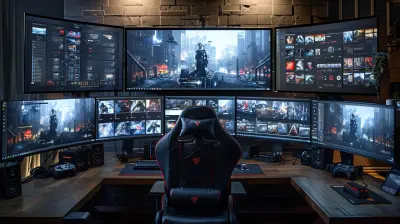Using Simulation Games to Understand Real-World Systems
5 August 2025
Ever dreamed of running your own city, managing an airline, or building a global empire from scratch—all without leaving your couch or risking a dime? 🎮 Well, you're not alone! Simulation games have exploded in popularity, and not just because they're fun. They're also incredibly powerful learning tools. These virtual sandboxes don't just entertain us; they help us understand complex real-world systems in ways textbooks never could.
So, let’s take a deep dive into how simulation games can give us a front-row seat to the inner workings of everything from urban planning to global economies. Buckle up—it’s going to be a wild, pixelated ride!
What Are Simulation Games Anyway?
Before we get too excited, let’s hit pause and ask ourselves—what exactly are simulation games?Simply put, they're games designed to simulate real-life activities or systems. That could mean anything from flying a plane to running a farm, building a city, or even organizing a pandemic response (hello, Plague Inc. 👋). The keyword here is “simulate.” These games mimic real-world rules, mechanics, and outcomes. You act, the system reacts—just like in real life.
A Quick Peek at Popular Simulation Games:
- SimCity – Urban planning and city management- The Sims – Social interaction and life simulation
- Microsoft Flight Simulator – Aviation and aircraft operation
- Cities: Skylines – In-depth city-building and infrastructure
- Factorio – Factory management and logistics
- Football Manager – Sports management and economics
- Plague Inc. – Pandemic modeling and global health systems

The Magic of Stepping Into the Driver’s Seat
Simulation games toss you into the role of decision-maker, and trust me, that’s where the learning begins. Instead of being told how stuff works, you figure it out by doing.Think about it—when you’re building a city in Cities: Skylines, you make calls on where to put roads, how to balance the budget, when to invest in public health, and how to keep the traffic from turning into a nightmare. You’re not just playing—you're learning. It’s like a crash course in urban planning but with no final exam (thank goodness).
Why This Hands-On Approach Works:
- Interactivity boosts engagement and memory.- Trial and error helps you understand consequences.
- Visual feedback makes abstract concepts concrete.
- Problem-solving skills are continuously being sharpened.
It’s kind of like learning to ride a bike by actually riding one, instead of reading about bicycles.
Complex Systems, Simplified
The beauty of simulation games lies in their ability to make complex systems understandable. Let’s face it—trying to get your head around topics like supply chain logistics or population growth from a dry textbook can be... well, a snoozefest. 😴But when a game like Factorio turns logistics into your main challenge, suddenly, you're solving bottlenecks, optimizing production lines, and managing resources like a pro. You start to see how interconnected systems work, and how one small tweak can ripple across the entire process.
Real-World Systems Simulated in Games:
- Economics – Understanding supply, demand, inflation (e.g., Capitalism II)- Environmental Systems – Managing pollution, climate (e.g., Eco)
- Social Systems – Behavior patterns, needs, and psychology (e.g., The Sims)
- Healthcare – Outbreak responses, resource allocation (e.g., Two Point Hospital)
- Transportation – Traffic systems, public transit design (e.g., Mini Metro)

Learning by Failing (and Laughing Along the Way)
Failure is frustrating—but in a simulation game? It’s hilarious, insightful, and free of real-world consequences. Want to see what happens if you build a city with no sewage treatment? Oh, it’s messy. Try running a farm without irrigation? Good luck feeding anyone. 🌱The beauty here is that every failure teaches you something new. You reflect, you adjust, and you try again. That’s not just good gameplay, that’s good learning!
Why Failure in Sims Is a Feature, Not a Bug:
- Safe environment for experimentation- Instant feedback helps you connect actions and outcomes
- Increased resilience through practice and improvement
- Encourages creativity in problem-solving
So don't stress if your first city collapses under budget cuts. You're just building real-world wisdom—one game over screen at a time.
Simulation Games in Classrooms and Beyond
Guess what? Schools are catching on. Educators are starting to use simulation games as teaching tools. Why? Because they’re engaging, interactive, and can explain tough concepts in a way that sticks.Imagine learning about economics not through charts and graphs, but by running your own virtual business. Or grasping biology by simulating the spread of diseases. It’s hands-on learning that doesn’t feel like homework.
Real Educational Uses:
- Model United Nations simulations: teaching diplomacy and international relations- Environmental simulators: showing ecosystem balance and conservation
- Flight simulators: real-world training for pilots
- Business tycoon games: developing entrepreneurial and finance skills
Even outside academic settings, simulators are used by professionals—pilots, surgeons, city planners—you name it. When the real thing is costly or dangerous, simulations step in.
How Simulation Games Build Soft Skills Too
It’s not just hard knowledge you’re picking up. Simulation games can seriously boost your soft skills. You learn to manage time, think critically, multitask, and even lead teams in multiplayer environments.Skills You Didn’t Know You Were Gaining:
- Strategic planning – prioritizing actions and long-term thinking- Time management – juggling multiple tasks and deadlines
- Team collaboration – in co-op or multiplayer modes
- Adaptability – responding to sudden in-game crises
Let’s be real—if you can handle managing a city’s power grid during a sudden storm in SimCity, you can probably ace that project deadline at work.
Let’s Not Forget the Fun Factor 🎉
All the learning in the world wouldn’t mean much if the games weren’t fun to play. And that’s the secret sauce of simulation games—they sneak knowledge in while you're just trying to keep your virtual citizens from setting the city on fire.Whether it’s watching your little digital people succeed in The Sims or optimizing your train network in Transport Fever, the thrill of building something from the ground up never gets old.
And honestly, who doesn’t want an excuse to call gaming “educational”?
Choosing the Right Simulation Game for You
Not sure where to begin? Here’s a quick cheat sheet based on your interests:| Interest | Game To Try |
|---------|--------------|
| Urban planning | Cities: Skylines |
| Life simulation | The Sims series |
| Aviation | Microsoft Flight Simulator |
| Business & economy | RollerCoaster Tycoon, Capitalism II |
| Healthcare | Two Point Hospital |
| Logistics | Factorio, Transport Fever |
| Environmental science | Eco, SimEarth |
| Social systems | Democracy series, Tropico |
Start with what you love, and the learning will follow.
Final Thoughts: More Than Just Pixels
Simulation games are more than just digital toys—they're gateways into the mechanics of the real world. They teach us, challenge us, and sometimes even humble us. Whether you're a student, a teacher, a gamer, or just someone curious about how things work, there’s a simulation game out there ready to blow your mind.So next time someone tells you gaming is a waste of time, flash them a grin and show them your thriving virtual metropolis, your balanced budget, or your pandemic response plan. You've got this!
Keep playing. Keep learning. And remember—sometimes the best way to understand the real world is to play a game about it.
all images in this post were generated using AI tools
Category:
Educational Value Of GamesAuthor:

Leif Coleman
Discussion
rate this article
2 comments
Abram Oliver
Great article! Simulation games are a fantastic way to explore complex real-world systems. They not only enhance learning but also spark creativity and critical thinking. Excited to see how these tools continue to shape understanding and engagement!
January 19, 2026 at 5:41 PM

Leif Coleman
Thank you for your insightful feedback! I'm glad you enjoyed the article and appreciate your thoughts on the impact of simulation games on learning and creativity.
Stella McBride
Great article! Simulation games offer a unique lens to explore complex systems, fostering both understanding and empathy. They bridge the gap between theory and practice, making learning engaging and impactful. Keep inspiring players to think critically about the world around them!
August 15, 2025 at 4:54 AM

Leif Coleman
Thank you for your insightful comment! I’m glad you found the article engaging and appreciate your emphasis on the role of simulation games in fostering understanding and empathy.


